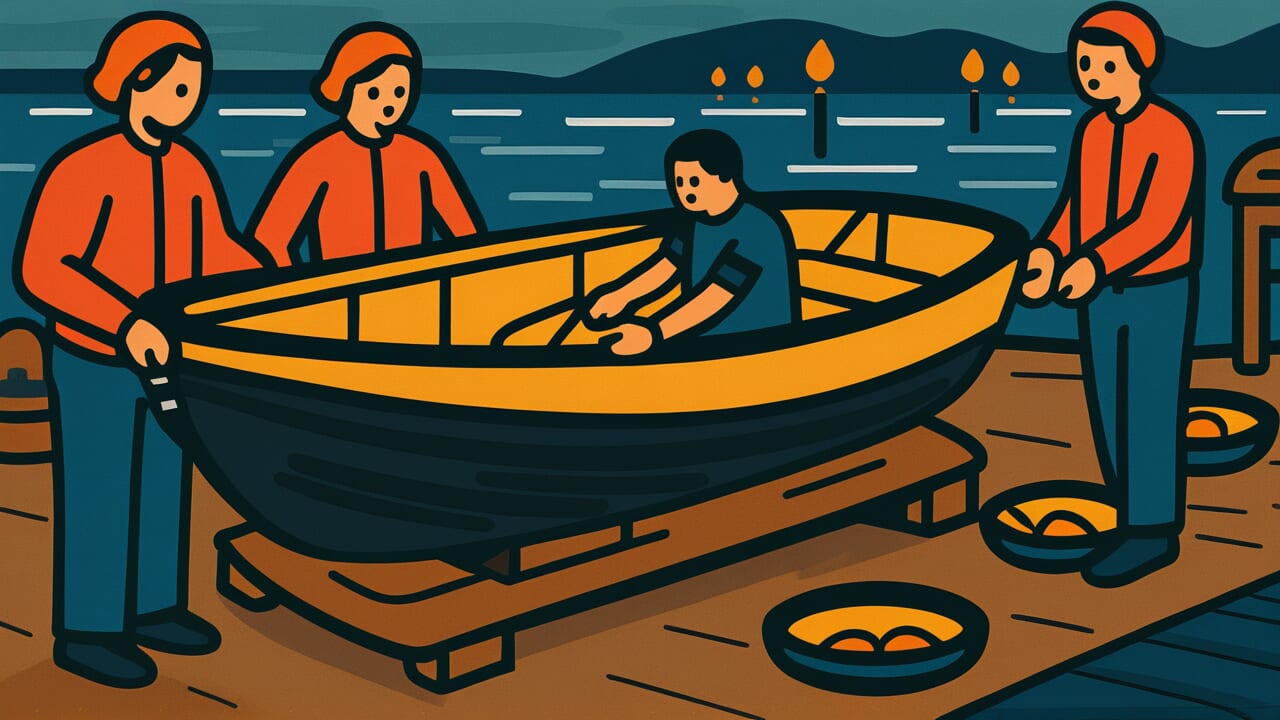How to Read “A small boat’s evening preparation”
Kobune no yoigoshirae
Meaning of “A small boat’s evening preparation”
This proverb teaches that careful preparation before tackling any task leads to safety and success. Just as fishermen prepare their small boats thoroughly in the evening before setting sail, we should prepare carefully before important work.
Small boats are unstable compared to large ships. Even a tiny problem can lead to serious danger. That’s why fishermen spend time inspecting and preparing everything while it’s still light out. This careful approach applies to all areas of life.
People use this saying when recommending thorough preparation before important work or events. For exam studying, presentations, or trips, you might say “Let’s prepare like a small boat’s evening preparation.”
It emphasizes preparing with plenty of time rather than rushing at the last minute. Today, people still understand it as a warning against failures caused by poor preparation.
Origin and Etymology
The exact first written appearance of this proverb is unclear. However, based on its structure, it likely originated in fishing villages or areas with active water transport before or during the Edo period.
“Yoigoshirae” means preparing for the next day during the evening. For fishermen and ferry operators using small boats, departing before dawn was routine. To head out to sea in the dark, they had to complete all preparations the night before.
This included inspecting the boat, checking tools, and preparing food and water. Small boats, unlike large vessels, can become life-threatening with even minor problems.
A broken oar, snapped rope, or water leak might seem small. But in open water, these small troubles become major dangers. That’s why careful preparation in daylight was absolutely essential.
This saying emerged from the practical wisdom of people who lived alongside seas and rivers. Experience taught them that rushed preparation leads to overlooked details.
The habit of preparing calmly at night guaranteed safety the next day. This life wisdom gradually spread as a teaching applicable to all aspects of life.
Usage Examples
- Tomorrow’s business meeting is important, so let’s perfect the materials tonight like a small boat’s evening preparation
- With one week until the entrance exam, I want to maintain the mindset of a small boat’s evening preparation and not neglect final checks
Universal Wisdom
Humans are strange creatures. We tend to postpone preparation until the last minute, especially for important occasions. We think “there’s still time,” but time passes quickly. Before we know it, we’re rushing to get things done. How many times have we experienced this pattern?
“A small boat’s evening preparation” offers a remedy for this human weakness. Because a small boat is fragile, neglecting preparation can be life-threatening. This sense of urgency makes people cautious.
Our ancestors understood a contradiction. People don’t get serious unless pushed to the edge, but by then it’s too late. That’s probably why they used the “small boat” metaphor.
If you imagine yourself in a small boat, the importance of preparation becomes deeply real. This teaching has been passed down through generations because failures from poor preparation repeat across time.
Even as technology advances, the human tendency to procrastinate remains unchanged. That’s why the image of fishermen preparing at night still resonates with us today.
Prepare carefully when you have time. This obvious truth may actually be life’s most difficult wisdom to practice.
When AI Hears This
Analyzing Edo-period fishermen preparing boats at night through modern systems engineering reveals surprising rationality. This is an optimization strategy using “temporal displacement.”
Morning time held extreme value for fishermen. Fish schools become active at dawn, and departing one hour late significantly reduces the catch. Morning hours and evening hours have completely different values, even though both are one hour.
Systems engineering calls this “temporal value asymmetry.” By shifting work to low-value evening hours, high-value morning hours can be concentrated on the core purpose.
Even more interesting is the “separation by task nature.” Boat preparation is predictable and can be planned. Fishing itself responds to the uncertain element of fish movement.
Mixing these two types reduces overall efficiency because unpredictable elements drag everything down. Evening preparation becomes a “risk separation strategy” that completes certain tasks first and leaves only uncertain elements for the actual day.
Modern factories prepare parts in advance through setup work. Surgical instrument checks before operations follow the same principle. Through experience, humans developed the ability to identify task nature and time value, then optimize their allocation.
This isn’t just preparation. It’s a sophisticated technology for optimizing time resources.
Lessons for Today
Modern society values speed. Quick decisions and immediate action are often seen as virtues. But this proverb offers us a different perspective. True efficiency doesn’t come from rushing around. It comes from calm preparation.
Think about your daily life. Compare work you rushed to finish at the deadline with work you prepared with plenty of time. Which turned out better? The answer is obvious, right?
The key to applying this teaching is a simple habit: “What can be done today, do today.” Organize tomorrow’s meeting materials tonight. Check next week’s schedule over the weekend.
Small acts of getting ahead accumulate to bring comfort and peace to your life. The important thing isn’t pursuing perfection. It’s simply starting a little earlier so you don’t have to rush.
That small mindfulness becomes a great force protecting you. Like a small boat captain preparing carefully on a quiet evening, why not incorporate this preparation time into your own life?



Comments